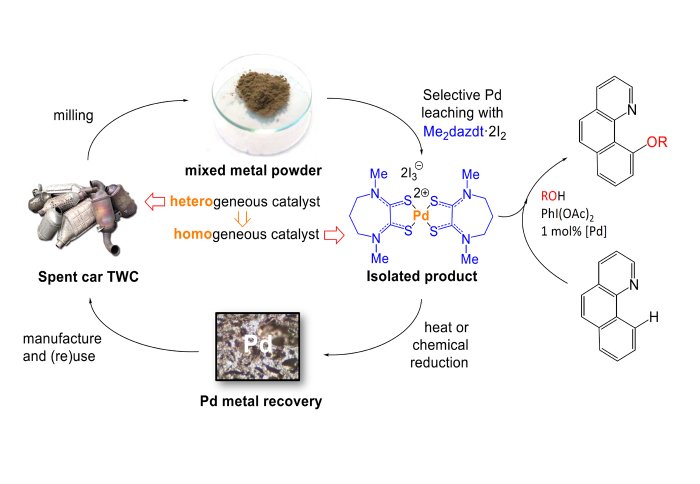Recover and reuse!

Research published in leading journal Green Chemistry on recovery and reuse of precious metal palladium from used catalytic converters in cars
Research in the Department on the recovery and reuse of the precious metal palladium from used catalytic converters in cars has recently been published in the leading journal in the field, Green Chemistry. In collaboration with Dr Angela Serpe from the University of Cagliari in Italy, PhD student Khairil Jantan and MRes Green Chemistry students Kuang Wen Chan and Cherry Kwok carried out the work in the group of Dr James Wilton-Ely. Together, they adapted a low-energy process developed by Dr Serpe to generate palladium compounds that can be used directly as catalysts for key catalytic processes such as those used to make pharmaceuticals.
Precious metals such as rhodium, palladium, platinum and gold underpin a vast range of technological processes. They are obtained using often environmentally-damaging mining processes, which have substantial impact on local communities. The existing deposits are located only in certain countries and their supply and price can often be compromised by geopolitical events. These factors have placed increasing pressure on the traditional sources of precious metals. One way to counter this is to recycle and re-use these metals from secondary sources such as automotive scrap and waste electrical and electronic equipment (WEEE).
Dr Serpe has patented a new, low-energy process that uses sulphur ligands to selectively recover the approximately 4 grams of palladium contained within each catalytic converter. This process was already at the pilot plant stage when she spent a year in the Wilton-Ely group at Imperial as a Visiting Researcher. Since the pioneering work by Nobel Prize winner, Sir Geoffrey Wilkinson FRS, Imperial Chemistry has been a centre of excellence in catalysis. This tradition continues in in the Department and the expertise provided by the Wilton-Ely research group led to the application of the palladium product of the recovery process to be directly valorised as highly-active catalysts for C-H oxidative functionalisation reactions. This approach avoids the high energy cost of passing through palladium metal or its salts, thus creating homogenous catalysts from used heterogeneous automotive catalysts.
Together with students from the MRes in Green Chemistry and MRes in Catalysis courses, the Wilton-Ely and Serpe groups are now working on applying their approach to different catalytic processes and other types of metal waste.
K. A. Jantan, C. Y. Kwok, K. W. Chan, L. Marchio, A. J. P. White, P. Deplano, A. Serpe, J. D. E. T. Wilton-Ely, Green Chem., 2017, 19, 5846-5853 [DOI: 10.1039/c7gc02678a].
Article text (excluding photos or graphics) © Imperial College London.
Photos and graphics subject to third party copyright used with permission or © Imperial College London.
Reporter
Maria Tortelli
Department of Chemistry